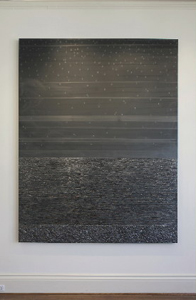
Continuing through October 22, 2010
Although Duchampian conceptualism has evolved into the theoretical basis for a major part of contemporary art, the freedoms it allows can easily lead astray artists lacking firm convictions, strong personalities and a wide perspective on art. There is nothing unresolved, tentative or unintentional, however, about Teresita Fernández, a much-praised New York conceptualist and winner of a MacArthur "genius" grant. Judging by the half-dozen mixed media works and installations here, the accolades are well earned.
Graphite is that semi-metallic coal-like form of carbon used in pencils, lubricants, arc lamps and carbon fiber. Graphene is a derivative, and it was reported in the news this week to promise a combination of lightness and strength that was previously inconceivable. Fernández' use of the material is similarly astonishing. She covers wooden panels with the slate gray material, achieving smooth, matte finishes that look machined. These are punctuated by starlike nodes and wavelike striations in low relief that are polished to a high gloss. While the palette and effect look subdued, at first glance, the works become deeper and richer as you explore their subtle changes. The three "Nocturnal" pieces, each a different size with distinct proportions, depict three registers of texturally delineated landscape (rocky pier), seascape (bark-like waves) and night sky (studded with stars) are particularly satisfying - minimal or abstract versions of a Van Gogh nocturne at the De Young Museum in the current Post-Impressionism show. Her sfumato installations mount small lumps of granite, affixed to tiny magnets that adhere to recessed screw heads, on the wall, centered over vertical smears or smudges, or shadows. To refer to photography, these smears are lens flares with reversed values. This is elegant, intelligent, lucid work fusing conception and perception.
Anthony Meier Fine Arts
